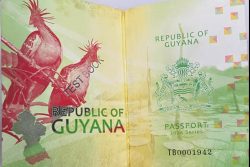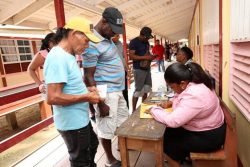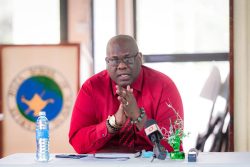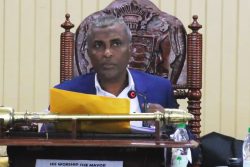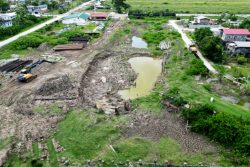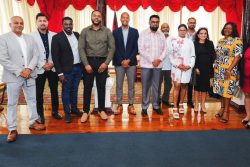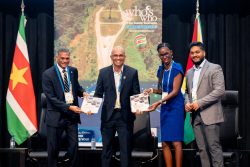The Guyana Prize for Literature Awards 2012 will be announced and presented tonight at the Awards Presentation to be held at the Pegasus Hotel starting at 7.00pm. His Excellency President Ramotar will hand over the Prizes while Prof Jane Bryce of UWI, Chairman of the Jury, will make the announcements after presenting the Judges Report.
The Prize was founded in 1987 when the first Awards were presented, and it has continued since then. Now, after 25 years, what can be said of this literary Prize and its relationship to the advancement of Guyanese and Caribbean literature? A look at the 2012 Shortlists might be relevant to this question. This is the annotated Shortlist as released by the Jury.
 Shortlists
Shortlists
Presented alphabetically for each category
Fiction
Ruel Johnson, Collected Fictions
(A semi-autobiographical collection of short fiction that addresses racial and political tensions, relationships and displacement)
Chaitram Singh, The February 23rd Coup (iUniverse Inc.)
(A fast-paced fictional account of an attempted coup by a group of disaffected Guyanese soldiers)
Poetry
Cassia Alphonso – Black Cake Mix
(A collection of evocative poems with a well-realized creole voice)
Ian McDonald – The Comfort of All Things (Moray House Trust)
(Elegiac musings by a mature poet on aging and mortality)
Sasenarine Persaud – Lantana Strangling Ixora (Tsar Publications)
(Complex, introspective poems with a bitter edge)
Drama
Harold Bascom – Deportee
(A screenplay for a crime thriller set in New York and Georgetown, involving deportation, narcotrafficking and corruption)
Mathifa Telford – Sauda
(A morality tale about the need for understanding and forgiveness between mothers and daughters, and the difficulties of escaping from a legacy of self-contempt)
First Book of Fiction
Only one entry was shortlisted from among those in this category. It will therefore be declared the winner.
First Book of Poetry
No work was considered suitable for a shortlist in this category.
One thing that may be observed is the brevity of the shortlists – a total of seven titles across the three major categories, which makes 2012 an unusual year. In the previous awards (2010) there were six shortlisted books in Poetry alone, reflecting quite a strong field for that year. This marked reduction in numbers may suggest a much weaker field so the Jury did not find many entries worthy of a shortlist. But what can be read into that, and does it suggest any trend in the upward or downward movement in the general quality of Guyana Prize entries?
In 2010 there was fierce competition for the Best Book of Fiction. There were three on the Shortlist, but what was significant was that it was three top-flight writers with strong entries. All three shortlisted authors in 2010 were former winners of major prizes. The eventual winner, David Dabydeen for Molly and the Muslim Stick, was a multiple winner of the Guyana Prize in addition to several other international awards. Janice Lowe Shinebourne (Chinese Women) was a former Guyana Prize Winner (Timepiece) and had been shortlisted on two other occasions. Karen King Arabisala was a Winner of the Commonwealth Prize for the Africa Region in fiction.
This year there are only two nominated by the Jury to contest for this Prize. One is a previous winner of the First Book of Fiction – Ruel Johnson for Ariadne and Other Stories in 2002. Apart from a collection of poems, this, Collected Fictions, is his first work since then. The other shortlisted fiction writer was previously unknown before this selection. Chaitram Singh is currently an academic in the USA and was formerly a commissioned officer in the Guyana Defence Force. He draws on that experience to produce the novel – a fantasy and thriller drama in military life and the politics of the 1980s titled The February 23rd Coup. He is a newcomer, previously unknown in Guyanese literature.
Two of the three nominated poets are well known and prominent Guyanese writers. Ian McDonald has won the Guyana Prize for Poetry twice over a period of 20 years (Essequibo and Between Silence and Silence) and has additionally been shortlisted on two other occasions. The other, Sasenarine Persaud, poet and novelist, has been on the Shortlist several times. The third writer in this category, however, Cassia Alphonso who is from Charity on the Pomeroon River, Essequibo, is unknown in the field.
The 2010 list was far more impressive with a staggering cast list of five previous winners of the Guyana Prize for Poetry or first Book of Poetry. These were Mark McWatt (the eventual winner), Stanley Greaves, Brian Chan, Maggie Harris and Berkley Semple.
The Drama shortlist also has a multiple Prize-Winner in Harold Bascom, who is a major Guyanese writer, a novelist as well as a visual artist. He is the virtual defending champion, having been the 2010 winner with a play of all-round strength – Blank Document. Bascom’s competition then, represented different backgrounds. Grace Nichols is a major Guyanese poet and novelist and a previous Guyana Prize Winner, while Janice Imhoff was new to playwriting. The other shortlisted dramatist for 2012, Mosa Telford, makes a first appearance in the Guyana Prize, but is no newcomer to drama, as she has been a member of the Theatre Guild Executive Committee and has won prizes for the plays she has written and performed in stage competitions.
Obviously then, there have been much stronger fields in recent years, and it is likely, not much to move the Jury on this occasion. However, two things may be said: one year is statistically insufficient to draw hard conclusions about trends. The second significant point may be found in the actual names to be found on this year’s Shortlist. Three of the seven writers are totally new, and more interestingly, four of the seven titles are unpublished manuscripts. Furthermore, four of the authors are locally resident writers.
One of the contentions in the past has been the overbearing dominance of foreign-based Guyanese writers who make the Shortlist and win the Prize. There have been many quarrels about this coupled with the claim that more needs to be done for the development of local writers. There has even been the baseless charge that the judges ignore the local unpublished writers and show a bias for the prestigious names. Two responses to these are that in spite of the preponderance of foreign-based winners, there have been many very significant and meaningful instances of local unknowns defeating the international celebrities the way Harischandra Khemraj did, and quite a few unpublished manuscripts winning the Prize over the 25 years.
Where development is concerned, not all the highly decorated writers who have won multiple Prizes were in that bracket when they won it for the first time. A good number of them have grown up with the Prize, and the existence and award of the Prize have helped tremendously in their rise to international fame. It can be said, therefore, that the Guyana Prize has contributed to the advance of Guyanese literature overseas. That is also important; not the local development alone. Outstanding examples of these are Fred D’Aguiar, David Dabydeen, Mark McWatt, Harold Bascom and Janice Shinebourne.
Where locally based writers are concerned, there are multiple winners among them, such as Paloma Mohamed. But more importantly, the Prize has embarked on measures which have made it more locally relevant, such as the strong series of writers’ workshops held in 2012 and 2013. It is not far-fetched to believe that the Prize has made it more achievable for local writers to gain recognition, more competence, and the ability to make shortlists and win prizes.
Local writers and unpublished manuscripts have surely become more visible in the Guyana Prize in recent years. They dominate the Shortlists in this year’s Awards.
